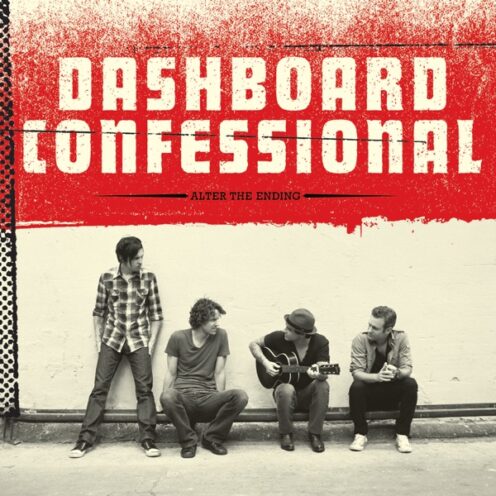
It’s no secret Chris Carrabba is a deeply emotional guy. Ever since he began releasing albums under the pseudonym Dashboard Confessional in 2000, his breathy-vocal ballads with plenty of heartache to spare have won over several crowds (check out his MTV Unplugged special if you don’t believe me). After releasing two big-budget, full-band records, Carrabba turned to his old faithful acoustic six-string once more to release the more-refined Shade of Poison Trees, which was not only a return-to-form, but a reminder that when given the ability to showcase his more nuanced side, Carrabba is one talented individual. The man must be a hit at campouts.
With Alter the Ending, Carrabba decided to go back into full-fledged rock band mode, acquiring two pop-rock connoisseurs in producers Butch Walker & Adam Schlesinger (Fountains of Wayne’s main songwriter/guitarist) to assist them in creating an eclectic blend of harrowing emotional pop with arena-sized hooks. Whether or not Carrabba wants to be Bono or a coffeehouse Casanova has yet to be determined, because Alter the Ending’s biggest drawback is the big production value over pre-determined substance, which hinders the potential of the weight these songs carry. The thematic material at hand is far more mature and gives Carrabba the opportunity to use this canvas as a means to explore a new side to his songwriting tasks. Less romanticized emotional outbursts and more perspective on touchier subjects makes this record blossom — but everything else it is comprised of tends to clutter its internal message and, above all, the integrity of these tracks.
”Get Me Right” feels strangely out of place, despite it’s uplifting intentions, but “Until Morning” captures the true spirit of why Dashboard Confessional can succeed without Carrabba having to fly solo; it’s a far more appropriate song for an introduction to an album that settles its point of reference on Carrabba’s emotional struggles with his sister’s fatal car accident, which left her in a coma, as well as the toll it took on him in the meanwhile – both personally, romantically and professionally. “Everybody Learns From Disaster” provides the type of fare we’re accustomed to from Carrabba, however it feels too cliche to provide any true insight or fulfillment. “Belle of the Boulevard” suffers from the same lack of momentum, and it’s hushed verses hardly give it any legs to soar as lead single choice. “Blame It On the Changes” uses choral bells over a U2-like production pallet to showcase Carrabba’s vocal talent, churning out a bright spot in a foggy first-half.
Once the album turns past the final checkpoint, it really picks up: “Hell On the Throat” is poetic beauty in the vein of Simon & Garfunkel, and “The Motions” is able to concoct a new sound approach for the band and actually work: handclaps and a lead synth riff drizzled over a zippy chorus allows its acoustic counterpart to sound even lovelier; it’s like Third Eye Blind jamming with Fountains of Wayne. “No News is Bad News” comforts the listener with its familiarity to older DC material, and displays the perfect balance of honesty and larger-than-life hooks. Ultimately, that’s the album real handicap: it’s extremely mainstream-friendly, and will appeal to a wide range of popular music fans, but it can’t seem to figure out its own identity (the title track alone throws you off on who this band is). Alter the Ending actually finds it’s biggest success in a deluxe edition package, which takes the new & heightened DC mentality and sets it in a Places You Have Come to Fear the Most-type environment.
Let me explain to the few of you who are raising your hands in the back of the classroom: the two-disc deluxe edition comes with the same album, but done acoustically, like how Carrabba used to do things (old school, son!). It is here that we find the true heart and soul of this material, and it is here that these songs are able to truly find grace & shine how they were meant to (except “Get Me Right” continues to sound just as awkward). Sadly, this is not the disc that’s meant to be heard and it’s a shame that these songs feel halted by a tepid pop-rock arrangement. It’s all certainly better than many other pop-rock bands, but when you’re on the fence about how you want people to hear your songs, it becomes a problem for the source material. “Belle of the Boulevard” experiences a far greater personality as an acoustic number over the album version, and even though there isn’t much difference, “Even Now” is the other (better) half to John Mayer’s “Your Body is a Wonderland” (sample: “Even now I can smell your skin / to wrap you in a towel/ lay you on the bed and try to love you”).
All in all, it’s a polarizing record: on one hand, it contains a handful of gems that work with a full-band, amps turned up high … but also stumbles with distractions from the real genius at hand here, which is Carrabba’s ever-evolving subject matter. 98% of the album succeeds best in the bonus “acoustic only” disc, and it’s difficult to ignore it — because it’s there! Alter the Ending is certainly not as bombastic as Dusk and Summer wanted to be and it’s more grown-up than A Mark, A Mission, A Brand, A Scar, but the band still wants to be a little bigger than what they might suggest. It is essentially in-between all that rubble from way back when, but as frequently as Carrabba wants to dust off his acoustic guitar after plugging it in… it’d sure be nice to know which way he was always leaning toward.
 Get Me Right
Get Me Right